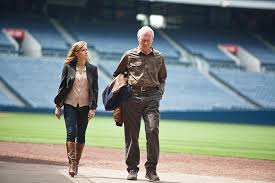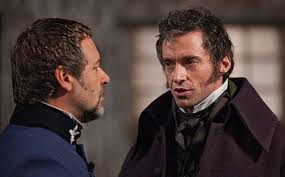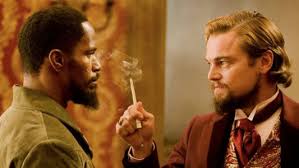The fall movie season has begun, which also means it’s Oscar season since most of the movies that win awards are released in the fall. Two different things with this year’s fall preview: 1) it’s in chronological order by release date, and 2) there’s a notation by the title if this movie is an Oscar Contender (for major awards, not best makeup or best sound editing). So, here goes…
The Perks Of Being A Wallflower The successful Y.A. novel comes to the screen, with the author in the director’s chair, which means it should stay close to the story. The movie boasts Emma Watson in her first major role after graduating from Hogwarts, playing Sam, one of two older students who help the hero, Charlie (Logan Lerman). (September 14th)
The Master(Oscar Contender) This movie is not about Scientology – it’s about a charismatic science fiction writer in the 1950’s who creates his own religion. Yeah, right. However, that really doesn’t matter. This is Paul Thomas Anderson’s follow-up to 2007’s There Will Be Blood, and it stars Philip Seymour Hoffman, Joaquin Phoenix, and Amy Adams. (September 14th)
Arbitrage (Oscar Contender) This could be Richard Gere’s ticket to the Oscar stage, or at least one of the seats in the front row for the nominees. He plays a billionaire whose world is threatened when he makes a mistake with his hedge fund. Susan Sarandon plays his wife. (September 14th)
End of Watch David Ayer, who wrote Training Day, wrote and direct this movie. He returns to the streets of LA, though this time his focus is two uniform cops (Jake Gyllenhaal and Michael Pena). The actors spent months riding along with the LAPD in preparation for their roles. (September 21st)

Trouble With The Curve (Oscar Contender) Clint Eastwood and Amy Adams – that’s enough to get me into the theater. After directing himself for two decades, Eastwood agreed to take the lead role for first-time director Robert Lorenz. Lorenz was Eastwood’s producer for those two decades, and also did Assistant Director work on Million Dollar Baby and Mystic River, among other movies. The movie also has Justin Timberlake, who’s become a fine actor, and it’s sort of about baseball. (September 21st)
Looper Joseph Gordon-Levitt grows up to be…Bruce Willis. Oh, it’s science fiction. Gordon-Levitt has reunited with Rian Johnson, with whom he made the well-received Brick in 2006. In the future, the Mob has found a better place to dump people than New Jersey – in the past, where assassins (called Loopers) are waiting to kill them. But what happens when Joe, a Looper, finds he’s been tasked with killing his older self? (September 28th)
Taken 2 The original Taken was a sleeper hit that turned Liam Neeson into an action hero. He had done “action” movies before, but they were usually historical and/or literary, including Rob Roy and John Boorman’s Excalibur. In the first movie Neeson’s character, Brian Mills, used his “particular set of skills” to wipe out the Albanian mob in Paris. Now Brian’s in Istanbul, visiting with his family, and the Albanians (the few left after the previous movie) want revenge. (October 5th)
Argo (Oscar Contender) tells a bizarre but true story that was kept classified for fifteen years. When the Iranian embassy was overrun in 1979, a half-dozen staff members who weren’t in the compound at the time of the takeover found shelter with the Canadian ambassador. To get them out, the CIA mounted a mission under the cover of a Canadian movie director scouting for locations in Iran for a sci-fi movie called “Argo.” Ben Affleck both directs and stars in the movie, with a strong supporting cast that includes Alan Arkin, John Goodman, and Bryan Cranston. (October 12th)

Alex Cross James Paterson’s detective has previously been embodied by Morgan Freeman, who’s a great actor but is about 30 years older than the character. This time it’s Tyler Perry filling Cross’s shoes, under the direction of Rob Cohen, who made the original The Fast and the Furious. It will likely be a more energetic portrayal. (October 19th)
Not Fade Away David Chase returns to New Jersey, where his HBO series The Sopranos was set. This time, though, it’s for a bit of nostalgia, looking at a group of three teens who form a band after seeing the Rolling Stones on TV during the group’s first US tour in 1964. He does have one holdover from The Sopranos. James Gandolfini plays the father of one of the bandmates. (October 19th)
Killing Them Softly I enjoyed The Assassination of Jesse James by the Coward Robert Ford, even though few people saw it. It was a very rare breed – a historically-accurate western. Now its writer/director Andrew Dominik is back with a contemporary thriller of a hitman tracking down two losers who rob a mob poker game, with Brad Pitt as the hitman. (October 19th)

The Sessions (Oscar Contender) This movie won the Sundance Festival’s Audience Award, and stars two excellent actors: John Hawkes (Winter’s Bone) and Helen Hunt. It’s the true story of Mark O’Brien, a poet and journalist, who’d spent much of his life in an iron lung because of polio. In his late thirties, he decides he wants to lose his virginity, and hires a therapeutic sex surrogate (who’s a married soccer mom). Also in the cast is William H. Macy. (October 26th)
Cloud Atlas This one is a “maybe” for me. It has a strong cast – Tom Hanks, Jim Broadbent, Hugh Grant, Halle Berry, Hugo Weaving – playing multiple roles that span centuries, but it could be a case of too many cooks. There are three directors, and they wrote the script together. Andy and Lana Wachowski did The Matrix, one of those films that changed how the movies after it were filmed. But they also did the two sequels, which were confusing and self-indulgent. Tom Tykwer made the exceptional Run Lola Run. Can they make a coherent movie? (October 26th)
Wreck-it Ralph This animated movie has Ralph, a classic video game bad guy, having a crisis of conscience after 30 years and going on a voyage of self-discovery through the video-game world. It was directed by Rich Moore, who’d worked on both Futurama and The Simpsons, with the vocal talents of John C. Reilly, Sarah Silverman, and Jane Lynch. (November 2nd)
Flight Robert Zemeckis returns to live-action movies after his so-so adventures to motion-capture animation. He’s taken on a lower-budget movie ($30 million) telling the story of a pilot who heroically lands his stricken plane, saving the passengers, but then is alleged to have been drunk at the time. While the budget is low, he attracted a first-rate cast with Denzel Washington as the pilot, supported by Don Cheadle, Melissa Leo, and John Goodman.

Lincoln (Oscar Contender) When you have Daniel Day-Lewis as the star of a movie, Oscar Contender is pretty much a given. When you have Steven Spielberg in the director’s chair, with David Strathairn, Sally Field, John Hawkes and Joseph Gordon-Levitt filling out the cast, and it’s based on the excellent book Team of Rivals, you have the stuff that cinema lovers’ dreams are made of. (November 9th)

Skyfall Finally, James Bond is back. The bankruptcy of MGM had put this new entry in the long-running series on hold for a while, giving Daniel Craig time to do The Girl With The Dragon Tattoo. Now Bond returns in what promises to be a strong movie. You have Oscar-winner Sam Mendes directing, who had worked with Craig on Road to Perdition, and you have Javier Bardem as the villain (so this could be No Country for Old Spies). Also in the cast is Naomie Harris (28 Days Later) as an up-and-coming new agent. (November 9th)
Anna Karenina (Oscar Contender) Leo Tolstoy’s classic novel of marital infidelity is coming to the stage and screen. This version is set in a theater where the actors are presenting the story. I was lukewarm at first when I heard about the movie, but it is being directed by Joe Wright, who did the 2005 adaptation of Pride and Prejudice along with the devastating Atonement in 2007. He’s also reunited with his star of those previous movies, Keira Knightley. With that pedigree, it’s definitely worth watching. (November 16th)
Silver Linings Playbook (Oscar Contender) David O. Russell has a knack with quirky comedy-dramas, having made such movies as Flirting With Disaster and Three Kings. He also made The Contender, a quirky but heartfelt true-life movie. His new movie, adapted from the 2008 novel of the same name, has Bradley Cooper as a former teacher who ended up in a sanitarium. Upon his release, he has to move back in with his parents (Robert De Niro and Jacki Weaver) who are die-hard Philadelphia Eagles fans. Cooper’s character connects with Jennifer Lawrence, who plays a young widow. Plenty of quirk there, and likely plenty of heart as well. (November 21)

Life of Pi (Oscar Contender) Adapting a bestselling book that centers on an Indian teen adrift in a lifeboat with a tiger could be seen as problematic. Several writers and directors were attached to the project, but bowed out. Finally the producers approached Ang Lee (Crouching Tiger, Hidden Dragon). If the trailer is an indication, he’s nailed the story. The visuals are stunning. (November 21st)
Hyde Park on Hudson (Oscar Contender) It sounds crazy to have Bill Murray playing FDR, but from the buzz this picture is generating it’s crazy like a fox. The movie is based on a BBC radio play dealing with a weekend get-together at his home in Hyde Park between the president and King George VI. It’s 1939, and without the support of the US, things are looking very dark for England as it faces Hitler’s Germany. The film’s told from the viewpoint of FDR’s niece and confidant, Daisy Stuckley, played by Laura Linney. (December 7th – an appropriate release date for a film about FDR and WWII)

Les Miserables (Oscar Contender) This is the top of my must-see list. I’d seen the musical version of Victor Hugo’s classic tale on stage in London with the original cast in 1986, and was enthralled throughout its three hour running time. I was also in tears several times. Now it’s come to the screen, with a dream cast of Hugh Jackman, Russell Crowe, and Anne Hathaway, directed by Tom Hooper (The King’s Speech). Watch for the Bishop early in the film, who saves Jean Valjean’s soul. He’s played by Colm Wilkinson, who originated the Valjean role in London and then on Broadway. (December 14th)
The Hobbit: An Unexpected Journey (Oscar Contender) I’m looking forward to this movie, though with a small sense of foreboding. The original LOTR trilogy is an all-time favorite of mine; once a year I’ll watch the extended versions in one sitting. This has Peter Jackson directing again, and has several holdovers from the trilogy (Ian McKellen, Cate Blanchett, Andy Serkis). But this time you have a trilogy coming from one book, filled out with other material from Tolkein’s writing. I remember another time when a director went back and did another trilogy to fill in the earlier story after making a very successful trilogy – yes, I’m talking to you, George Lucas. (December 14th)

Zero Dark Thirty (Oscar Contender) Rep. Peter King (R-NY) got his knickers in a twist when this movie, about the hunt for Osama bin Laden, was announced with a release date before the presidential election. He wanted to have hearings about whether the filmmakers got access to classified documents. Later the release date was moved to December. The movie is directed by Kathryn Bigelow and written by Mark Boal, who did 2009’s The Hurt Locker, and stars Jessica Chastain and Joel Edgerton (who did the ethically-challenged detective on AMC’s The Killing). (December 19th)
Jack Reacher There’s been a lot made about star Tom Cruise not measuring up to bestselling author Lee Child’s character, who’s about 10 inches taller than Cruise and brawny. But after Mission Impossible: Ghost Protocol I’ve a feeling Cruise will bring it off. The movie’s based on Child’s 2005 book, One Shot, and was adapted by Christopher McQuarrie, who wrote The Usual Suspects. McQuarrie also directs a cast that includes Robert Duvall, Rosamund Pike, and German director/writer/actor Werner Herzog. (December 21st)
The Impossible This thriller tells the true story of a family who almost died in the 2004 Christmas Tsunami. It stars Ewan McGregor and Naomi Watts as the parents who struggle to survive. The picture was filmed on location, and most of the tidal-wave was not done with special effects but with real water. (December 21st)
This Is 40 Judd Apatow has created his newest comedy in an unusual way. He took Pete and Debbie and their kids, the supportive family who helped Seth Rogan in Knocked Up, and wrote a new movie centering on them facing the milestone of both turning 40. He also kept the same actors in the roles. It likely helped that Paul Rudd has worked with Apatow on a couple of movies, Leslie Mann is Mrs. Apatow, and the two kids are Maude Apatow and Iris Apatow (nepotism has its benefits). The cast also includes Jason Segel, Megan Fox, and Albert Brooks. (December 21st)
On The Road Walter Salles directed The Motorcycle Diaries, an excellent road picture dealing with a historic trip taken by a young Che Guevera. Now Salles is directing the ultimate road book, Jack Kerouac’s On The Road. The main stars are Garrett Hedlund, Kristen Stewart, and Sam Riley, but the movie also boasts an incredible slate of actors in smaller roles or cameos, including Kirsten Dunst, Terrance Howard, Viggo Mortensen, Steve Buscemi, and Amy Adams. (December 21st)
Parental Guidance This Christmas, the gift for movie lovers is the return of several beloved comedic actors in major roles (see following review as well). Here you have Billy Crystal and Bette Midler as grandparents asked to babysit their three grandchildren for a week. However, there daughter (Marisa Tomei) is a helicopter parent who doesn’t fully trust her parents. (December 25th)
The Guilt Trip After only doing a couple smaller supporting roles over the past 16 years, Barbra Streisand returns in a major role in this road comedy, playing Seth Rogan’s mother. This will be a Christmas present to all of Streisand’s many and loyal fans. (December 25th)

Django Unchained (Oscar Contender) Quentin Tarantino has an interesting relationship with history, as evidenced by Inglourious Basterds, where WWII was won by Brad Pitt and his commandos assassinating all the Nazi high command in a movie theater in Paris in 1944. Now he’s cast his eye at that most American of movie genre’s, the Western, though it’s mixed in with the antebellum South. In the lead roles, Jamie Foxx plays a slave seeking revenge on plantation owner Leonardo DiCaprio. The best thing to do with a Tarantino film is leave your reason at the movie theater door and just enjoy his crackling dialogue and action sequences. (December 25th)
